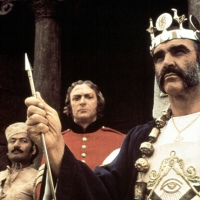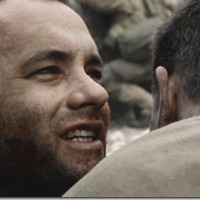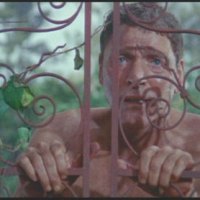Robert Redford, Glenn Close, Kim Basinger, Robert Duvall, Barbara Hershey, Wilford Brimley
Directed by Barry Levinson
Written by Robert Towne and Phil Dusenberry; adapted from the novel by Bernard Malamud
“And then? And then when I walked down the street people would’ve looked and they would’ve said, ‘there goes Roy Hobbs, the best there ever was in this game.'”
Sports movies always have a particular effect on the American public because of how closely we associate the games that we love to play with our own humanity. Competition that brings out the best in us, idolatry of those that are truly the best pitchers, quarterbacks or point guards that have ever played, and the sheer wonder that comes from watching and enjoying.
The Natural is unlike any sports film of any era. Just keeping to the baseball genre, I would describe baseball’s best entry into film, Field of Dreams from 1991 – part of the “Kevin Coster Can Do No Wrong” era of the early nineties – as a reunification of estranged father and son through their mutual love of baseball. The numerous excellent baseball biopics of the last twenty-five years – Eight Men Out in 1988, Cobb in 1994 and the wonderfully canned and seminal The Pride of the Yankees in 1942 starring Gary Cooper as Lou Gehrig. – have shown that American has devoted its best filmmaking in sports to the baseball medium.
Based on a fictional work by Bernard Malamud, which is in turn loosely based on two cases in baseball history that mirror its overall plot, The Natural focuses on something much more important than baseball’s players or their frequently tainted stats. It looks at the sport’s mythos; the tradition and lore of a game that at one time was one of the most astonishing aspects of our still-new and thriving country, and the wonder that to this day is still associated with a game that’s so inextricably linked to the roots of our culture as Americans.
Robert Redford, the most all-American actor of his day and the cinematic descendants of Cooper and James Stewart, plays the film’s main focus – Roy Hobbs – a 19-year old pitching maven with a beautiful blond girlfriend (Glenn Close) from midwest America who is invited to tryout with the professionals.
Young and naive, Hobbs is falls prey to the allure of a mysterious woman (played briefly but oh-so-memorably by Barbara Hershey), who enchants him with her furtive gestures and interest in how great he will someday be. Hobbs, enamored, doesn’t see the madness in the woman’s eyes and before he knows it becomes a victim to the woman’s insanity in a sudden burst of violence that sidetracks what we as the audience and Hobbs know remorsefully could have been the best career ever.
The heavy thematic presence of fate and God-given talent not to be denied by man comes through time and time again in The Natural‘s plot, and was not a small source of derision for many critics of the time. In obscurity for 16 years, Hobbs suddenly comes to New York and subtly demands to be put on a team – as though he has a time limit on his 35-year-old body – and gets a sudden chance to start when the right-fielder (Michael Madsen in an early role) is killed in a freak accident on the field.
Given the opportunity, Hobbs becomes the best player in any league and leads his new team – the hapless New York Knights – to a sudden surge of wins. His streak is only diverted by the arrival of a beautiful young woman (Kim Basinger), whose prettiness is a front for her subversiveness, as she is being paid and pampered by the Knights’ management to throw Hobbs off his game because – as true baseball villains – they have money betting against their own franchise.
Hobbs, naturally, is easily swayed by the film’s sirens, which brings up Homeric themes to go with others. His hitting slump leaving fans wondering if he was just a flash in the pan, he travels with the team to play the White Sox. Halfway to striking out, Hobbs glances in the crowd and sees a white-clad woman illuminated in sunlight. After seeing the vision, Hobbs bullets a game-winning home run that blows apart the scoreboard. The vision turns out to be his long-lost girlfriend Iris, who lives in Chicago with her son and for some reason carries an oblivious torch in Hobbs and his future that the oblivious farmboy cannot connect the dots to.
Back in New York, Hobbs is still enchanted by his meeting with his sweetheart of old and thus loses the heavy interest he was had in the siren, Memo. His play goes back to his true form and thus Memo is forced to resort to more blatant methods.
Recovering in the hospital from poisoning, the doctors uncover a relic from long ago still lodged in his stomach, something that the doctors say will kill him if he plays just one more game. Incidentally, the Knights – now in the championship against Pittsburgh – have lost every game without Hobbs and have one more chance before they lose the pennant.
Hobbs battles through the pain and comes to the game just when his team needs him.
The film’s conclusion rests firmly -and deservedly – in sports’ film lore. As Hobbs slumps and his stomach wound – a decades-old reminder of past misfortune – causes him to play poorly, he learns that Iris’ son – his son – is watching. His final, pennant-winning, lightning-aided home run that crashes into the overhead lights, sending a cascade of exploding glass and sparks down on the field as he rounds the bases, is cinematic glory.
The beauty of the natural, shot by veteran American Zoetrope cinematographer Caleb Deschanel, is one part period imagery and the other part an unabashed script that hearkens back to the sports’ golden age.
Hobbs’ naive but pure love of the game is put up against the dishonest, truly unsportsmanlike chattering of surreptitious gambling and fixed-gaming. The sudden detour early-on from a baseball career set inevitably in motion from Hobbs’ youth comes back to him at age 35, giving him a second chance at glory and redemption.
These are much-clichéd theses in film and especially in the not tiny subgenre of baseball cinema, but The Natural did it better than any mimicker. Redford’s iconic, idolized performance is filled with nuances and script truisms that would sink a less-honest actor. Glenn Close’s angelic portrayal of Iris, reserved, wise but nevertheless full of love and support – never giving Hobbs what she knows he has to realize himself – is beautiful. Drenched at times in sepia tones, the film’s beginning and ending – a classic game of catch amongst the tall hayfields of rural America – hearkens to Terrence Malick’s Days of Heaven in 1978 – and is portrait-like in its imagery and gravitas.
The film’s ode to the innocence and virtue of baseball is palpable, and at times very touching. Before he goes out of the locker room to play the game of baseball that might be his last, Hobbs is stopped by manager Pop Fisher (a soft moment by burly actor Wilford Brimley). Having constantly complained of his station as manager of the worst team in the league, Pop echoes earlier sentiments when he says to Hobbs, “My mother always wanted me to be a farmer.”
Answering straight and true, Hobbs responds, “My dad wanted me to be a baseball player.”
The father-son theme, touched upon briefly when we see, muted, his father collapsing outside after a game of catch, is always a resounding motif. Following his father’s death a young Hobbs watches a tree in the backyard suddenly get struck by lightning. In true baseball mythos, he fashions the fallen, mystical branch into a bat – Wonderboy – which becomes part of his folklore as Hobbs climbs the ranks.
Struggling in the final game of the pennant, Hobbs hits what he thinks is a sure home run, but it moves depairingly down the foul line. What’s worse, Wonderboy breaks in two on the hit. Hobbs asks the ballboy, Billy Savoy, to pick him out a winner as he steps up to the plate. He is given the boy’s own homemade bat, the one Hobbs taught him how to make, with “Savoy Special” etched along the side like Wonderboy. They both smile at each other, Hobbs in thanks and Savoy in heartfelt, innocent adoration and Hobbs uses the bat to win the game.
These poignant moments do more than pull at heartstrings. They are part of something much larger in the plot; a throwback to a time when the tossing of a ball from father to son was a mandatory aspect of growing up, when cheating in sports was unfathomable, and when talents shown by superhuman players were, the term having a greater meaning back then, God-given.
The Natural is a wonderful chestnut of cinema and one of the most resonant sports films. It’s a film that reminds us of a heritage we may have forgotten that is steeped into our culture, and of an unadulterated honest love of the game that hearkens back to simpler times, but perhaps times that we can learn from in our present.
Images courtesy of imdb.com, blogs.amctv.com and getfilm.co.uk, respectively.











love it